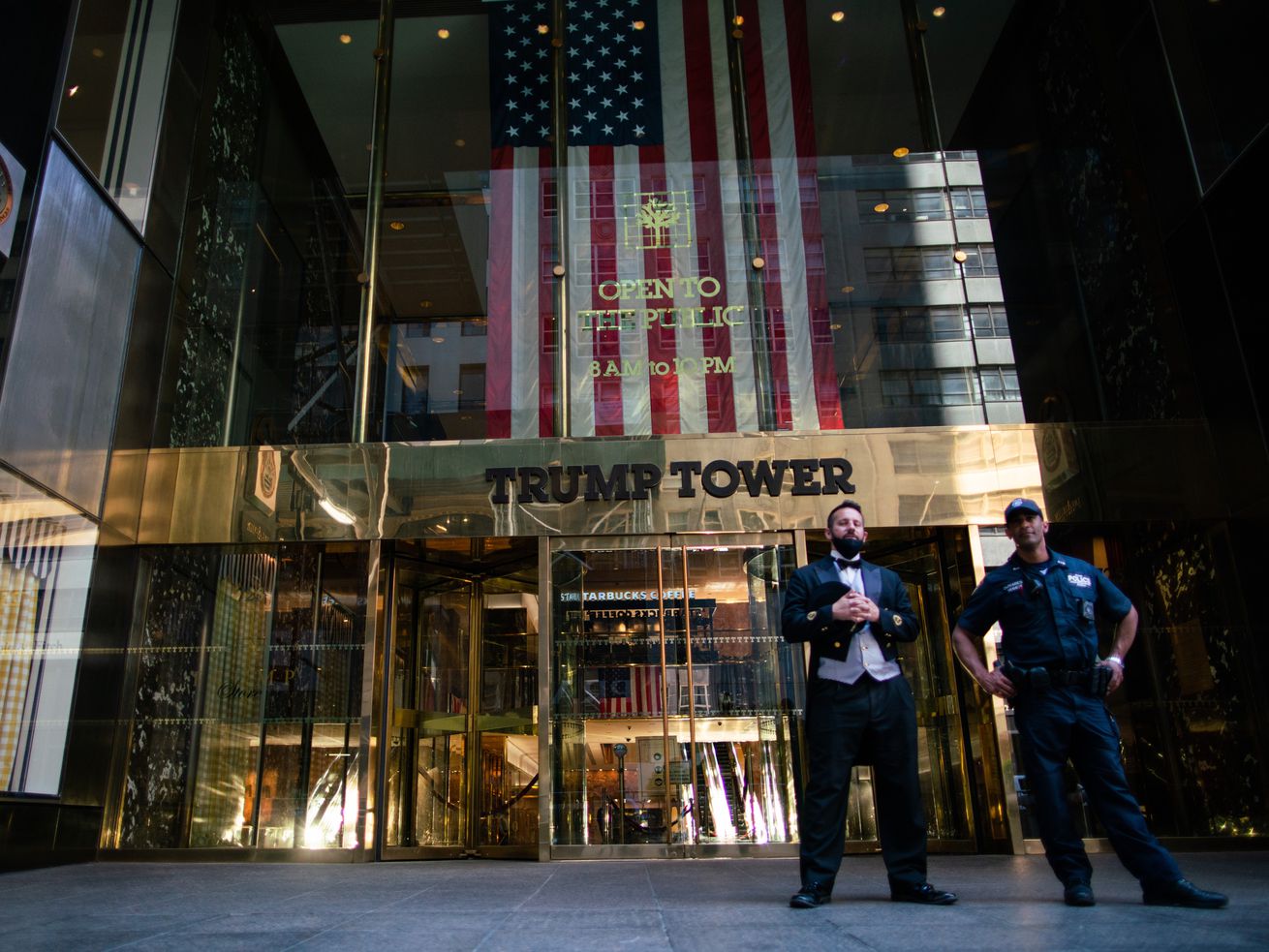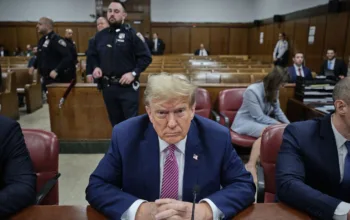The charges include tax fraud and grand larceny. Here’s what’s really going on.
New York state prosecutors on Wednesday indicted the Trump Organization and its chief financial officer Allen Weisselberg for tax fraud, the first charges brought as part of Manhattan District Attorney Cy Vance’s investigation into the former president’s company. The indictment was unsealed Thursday.
This isn’t just your run-of-the-mill tax case. Prosecutors said in court that their investigation is ongoing, and they’re reportedly trying to make an even broader case against the company or even the former president himself (Trump has not been charged).
So to understand it, it’s useful to think about it through three separate lenses — the charges themselves, what they mean for the larger ongoing investigation, and the potentially massive consequences for American politics.
The charges allege that Weisselberg and the Trump Organization did not properly pay taxes related to $1.7 million worth of “fringe benefits” Weisselberg received as part of his salary — most notably apartment and car leases for Weisselberg and private school tuition for his grandchildren. The specific charges also include conspiracy and grand larceny, but those too are related to these fringe benefits. Both Weisselberg and the company pleaded not guilty.
But reports in recent months have made clear that Vance’s investigation is focused on more than just corporate perks. He has also been probing matters close to the heart of the Trump Organization’s business practices, examining whether the company overvalued certain properties to score favorable loan terms while undervaluing them to pay less in property taxes. He even obtained Trump’s tax returns after a battle that went to the Supreme Court.
It’s this broader investigation that may be the true danger to Trump — if Vance can make a case, that is. And prosecutors have been trying for months to “flip” Weisselberg and turn him into a cooperating witness. They have not succeeded in doing so, and that’s the background to Thursday’s charges.
The stakes here are far higher than in any ordinary corporate tax fraud case, because the possibility that Trump will run for president again in 2024 looms. Charges against his company and, potentially, future charges against him would pose an obstacle to a future campaign. Trump’s many critics view him as a danger to the country and feel certain he’s a habitual lawbreaker, and therefore are hoping he gets “brought to justice” somehow — whatever the details.
Trump and his defenders, meanwhile, have decried Vance’s investigation as a politically motivated witch hunt (Vance is a Democrat, though he chose not to run for reelection this year). And there are indeed questions about whether these charges would be brought against any company other than Trump’s. According to the New York Times, it is “highly unusual” for prosecutors “to indict a company for failing to pay payroll taxes on fringe benefits alone.” Then again, the evidence here appears strong — it includes that the Trump Organization kept internal spreadsheets tracking some of Weisselberg’s expenses.
The charges, explained: Allen Weisselberg and “fringe benefits”
Allen Weisselberg is Trump’s longtime money man. He has worked for the Trump family since the early 1970s, first as an accountant for Donald Trump’s father Fred, and eventually rose to his current post as CFO of the Trump Organization. When Trump assumed the presidency, he handed over management of that company to three people — Donald Trump Jr., Eric Trump, and Weisselberg.
“He knows where all the financial bodies are buried,” Trump biographer Tim O’Brien tweeted recently. Indeed, Trump lawyer Michael Cohen testified before Congress in 2019 that Weisselberg had worked with him to arrange hush-money payments to women alleging affairs with Trump.
As CFO of the Trump Organization, Weisselberg received an official salary. But he also received various lucrative perks on top of that — “fringe benefits.” These included:
- An apartment lease: Trump’s company paid the lease and utility bills for an apartment on Manhattan’s Upper West Side that prosecutors say has been Weisselberg’s primary residence since 2005.
- Car leases: Trump’s company paid the leases on two Mercedes-Benz cars used by Weisselberg and his wife.
- Private school tuition: From 2012 to 2017, either Trump or a Trump trust paid hundreds of thousands of dollars in tuition to a New York City private school for two of Weisselberg’s grandchildren.
Though fringe benefits such as these aren’t technically part of an employee’s salary, they have monetary value and as a result should be considered taxable income paid by the employer. (Certain types of fringe benefits, like employer-provided health insurance, are excluded from taxation, but most aren’t.)
Prosecutors allege that both the Trump Organization and Weisselberg participated in a scheme to avoid paying taxes on these perks. They argue that the Trump Organization should have paid payroll taxes, and that Weisselberg — whom they allege also hid his New York City residency — evaded more than $500,000 in federal taxes, more than $100,000 in state taxes, and more than $200,000 in New York City taxes.
The charges against Weisselberg also include “grand larceny,” but by that prosecutors mean that he didn’t pay a large amount of taxes.
The public defense from Trump so far has basically been that “everyone does it.” In an earlier statement, Trump said he was being investigated for practices that are “standard practice throughout the U.S. business community, and in no way a crime.” Yet neglecting to pay taxes on fringe benefits like these does seem to be a criminal act, even if it is rarely enforced so aggressively.
This is part of a broader investigation
In isolation, the fringe benefits tax charges may not seem particularly consequential. But they are reportedly one part of a broader probe of the Trump Organization that prosecutors have been conducting.
Investigators — led by Manhattan District Attorney Cy Vance’s office, with some participation from New York Attorney General Tish James’s office — have reportedly focused on two other topics.
1) Hush money: Vance initially opened his investigation in 2019 and originally focused on those hush-money payments Cohen had arranged. Cohen pleaded guilty to violating federal campaign finance law with these payments, but Trump himself wasn’t charged by federal prosecutors. Vance then looked into whether any state laws were broken. There has been no recent news of this aspect of the investigation, suggesting it may be dormant.
2) Real estate valuation practices: Instead, in recent months, leaks have suggested Vance was focusing on matters close to the heart of the Trump Organization’s business practices: how it valued real estate. The theory here is that Trump overvalued certain properties when he sought loans and insurance policies but undervalued those assets for tax purposes (so he’d owe less in property taxes). Cohen alleged such behavior in his congressional testimony in early 2019.
The crimes here, in theory, would be tax fraud, bank fraud, or insurance fraud. This is widely believed to be the case Vance is trying to make in his attempt to flip Weisselberg. Whether he’d have a case if Weisselberg refuses to flip is unclear. Some legal experts believe it would be difficult to prove Trump’s knowledge of company financial crimes without Weisselberg’s testimony.
This could be enormously consequential for American politics
The biggest unknown hanging over all this is whether Trump himself will face charges — and what that might mean for the 2024 election.
Trump’s attempt to overturn Joe Biden’s victory in last year’s presidential contest confirmed the long-running fears of many that he was a menace — a uniquely dangerous figure posing an authoritarian threat and imperiling the United States’ system of free and fair elections.
So the question of whether Trump will run for office again in 2024 is of major importance, and lately he’s been hinting that he will.
The current charges are unlikely to have any significant impact on Trump’s 2024 decision-making. But further charges, including charges against Trump himself, may weigh on him more heavily and, theoretically, could even land him in prison, where it would be difficult to hold rallies. (Though he could theoretically follow Eugene Debs’s model and run from prison.) Trump is not yet facing any charges, though, and it’s not clear if he ever will.
Liberals who dislike and fear Trump, and Republicans who dislike his influence and hope to return their party to some semblance of normalcy, have been dearly hoping that he’ll be … taken out of the equation somehow. That perhaps he’ll choose not to run again for his own reasons, or perhaps his health will intervene (or perhaps criminal charges will).
Many Trump critics are so convinced he is such a blatant criminal that “getting” him on even small-ball charges would be laudable — akin to taking down Al Capone for tax evasion. The former president’s estranged niece Mary Trump told the New Yorker, “It’s incredibly urgent that Vance prosecutes Donald now.”
But to do that, they’d need a case. And Trump and his defenders have cried foul, claiming Vance has been fishing about for whatever case he can find and ended up with a weak one, and that it’s a sign the whole investigation was politically motivated all along — that it was just an effort to “get Trump.”
It’s hard to say for sure without knowing the full picture of what Vance has found. Perhaps this really is the best he’s got. Or perhaps he has strong evidence of further criminality and is building toward a bigger case that we just haven’t seen yet.
Author: Andrew Prokop
Read More



